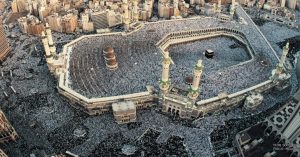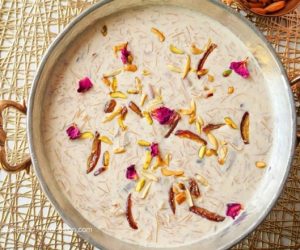
Dr. Sayema Rahman Khan: Reflections on Eid-ul-Fitr: A Celebration of Gratitude, Feasting and Community Spirit
Eid-ul-Fitr (Eid in Arabic means ‘festival’ or ‘feast’, and Fitr means ‘breaking the fast’), celebrated by over 2 billion Muslims worldwide, is the culmination of the sacred month of fasting, Ramadan. Of the two Eids in Islam (the other being Eid-ul-Adha) – Eid-ul-Fitr is my personal favourite. Perhaps because the joy of celebration comes after a month of devoted fasting and prayer.
The Anticipation: Moon Sighting and Preparations for Eid Day
Since the Islamic calendar follows the lunar cycle, the exact date of Eid depends on moon sighting. I still cherish childhood memories of gathering on the top-floor terrace of our house in India to open our final fasts, so we could catch the first glimpse of the new moon. My brothers and I, binoculars in hand (calling them our “baby telescopes”), would compete to spot the first sliver of the moon. We would point excitedly at anything resembling a dot in the sky, waiting eagerly for my father to return from the mosque with the official announcement. The thrill of hearing “Eid Kal Hai” (In Urdu: ‘Eid is tomorrow!’) never fades. As lunar sightings vary by region, Eid could be observed on different days around the world. So a frenzy of WhatsApp ‘Eid Mubarak’ (‘Blessed Eid’) messages begins virtually even before Eid day, sharing the joy across time zones.
Once the moon sighting is confirmed, a sense of celebration immediately kicks in. No more waking up before dawn for ‘Suhoor’ (pre-dawn meal in Ramadan). Instead, it is time to prepare for Eid day—applying Henna, decorating the house, sorting out last-minute gifts, planning out the day to visit friends and relatives, preparing special Eid sweets and not to forget finalising opulent Eid day outfits.
Eid Mornings: Prayer, Gratitude and Charity
 Picture shows a vast congregation of Muslims offering Eid Salat at the revered Holy Mosque in Makkah, Saudi Arabia
Picture shows a vast congregation of Muslims offering Eid Salat at the revered Holy Mosque in Makkah, Saudi Arabia
The day of Eid-ul-Fitr begins with a morning communal prayer (‘Eid Salāh’), usually held in mosques, large congregation halls or open fields. Muslims from all walks of life and ages attend, dressed in their finest traditional clothes and favourite fragrances, as a symbol of renewal. This special prayer is an addition to the five mandatory prayers a Muslim performs every day.
Eid prayers include a sermon, the Eid Salāh, and a supplication offering gratitude for blessings—asking for recompense for the fasting period, a reward for our spiritual efforts. A key element of the prayers is ‘Zakat-ul-Fitr’ (Eid charity), a donation of the cost of one meal to be given before Eid Salāt. This is compulsory for every self-supporting adult Muslim and their household, to support those in need within the community celebrating Eid.
Festivity begins: Feasting, Togetherness and Traditions
After prayers, the atmosphere is festive, with Muslims engaging in the various joyous traditions to celebrate the conclusion of Ramadan. Traditions vary by region and culture, creating a rich mosaic of Eid-ul-Fitr celebrations around the globe. Each family create their own cherished traditions too – but one aspect is the same across the world, it is a day to eat and celebrate—Eid day is a feast day!
Eid sweets are a beloved tradition, unique to every culture. In my hometown, Chennai, we make Sheer Khurma—a rich vermicelli milk pudding with ghee, nuts, and sugar, popular across the Indian subcontinent. In my family, we also cut a cake post-Eid prayers, which always gets my three kids (and the adults) excited—who doesn’t like cake for breakfast! Other Indian Eid dishes that we prepare include biryani, korma, kebab, halwa, kheer, and much more.
 Picture shows South Asian sweet treat, Sheer Khurma. PC: foodfusion.com
Picture shows South Asian sweet treat, Sheer Khurma. PC: foodfusion.com
The day turns into an eating marathon as friends, family, and neighbours pay home visits and exchange their unique traditional and beloved Eid delicacies.
One of the other traditional highlights of Eid, especially for children, is ‘Eidi’—money gifted by elders. The younger you are, the more you tend to collect. It is such a well-expected tradition, that adults often keep extra cash handy just in case a child extends their hand expectantly asking for ‘Eidi’. Growing up, my cousins and I carried small purses to store our ‘Eidi’ collection. By evening, we would count our ‘wins’ and flaunt our earnings with everyone. Though family traditions differ, Eid brings together people of different cultures, countries, languages, and backgrounds for the celebration.
The Heart of Eid: Joy, Community and Belonging
In essence, Eid isn’t so different to any other festival of joy, sharing, caring and gratitude. It is a memorable time of food, laughter, games, and togetherness. But for some, it can also be a solitary time—international students far from home, the elderly without close family, or those whose loved ones live abroad. As a first-generation migrant in the UK, I understand celebrating Eid can be isolating with the absence of close family nearby and practicing long held traditions in a new cultural environment can bring up a sense of longing.
The University of Manchester networks hold Eid events to bring the community together and create a ‘sense of belonging’. Some celebrations to be held this year in or around the University campus are here: MSN Network; Parents, Carers and Guardians Network; Manchester Museum. These events are wonderful opportunities to come together, share in the joy, and appreciate the diversity of our community. There are also several Eid parties celebrated throughout Manchester and around the UK – open to all – a sense of the community coming together is the crux of it all.
This year, Eid-ul-Fitr in the U.K. could fall on either the 30th or 31st of March 2025. To all celebrating—Eid Mubarak! May this Eid bring peace throughout the world, as well as happiness, and countless blessings to you and your loved ones.
Dr. Sayema Rahman Khan, Research Project Officer, FBMH






0 Comments